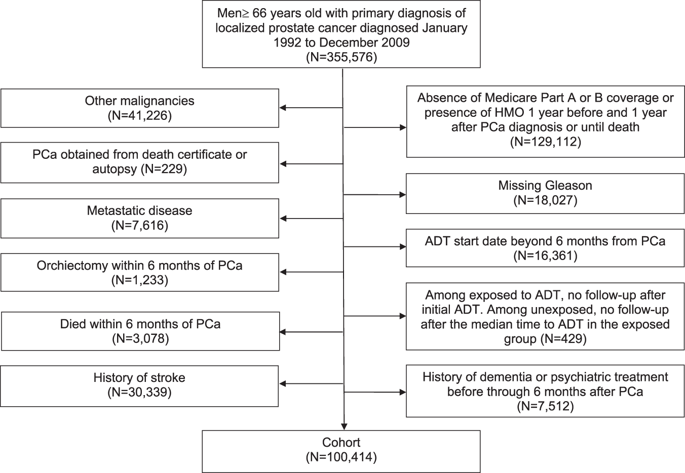Prostate Cancer and Prostatic Diseases ( IF 5.1 ) Pub Date : 2019-11-29 , DOI: 10.1038/s41391-019-0189-3 Anna Krasnova 1, 2 , Matthew Epstein 3 , Maya Marchese 1 , Barbra A Dickerman 4 , Alexander P Cole 1 , Stuart R Lipsitz 1 , Paul L Nguyen 5 , Adam S Kibel 1 , Toni K Choueiri 6 , Shehzad Basaria 7 , Lorelei A Mucci 4 , Maxine Sun 6 , Quoc-Dien Trinh 1

|
Background
Evidence for androgen deprivation therapy (ADT) and risk of dementia is both limited and mixed. We aimed to assess the association between ADT and risk of dementia among men with localized and locally advanced prostate cancer (PCa).
Methods
We conducted a retrospective cohort study using SEER-Medicare-linked data among 100,414 men aged ≥ 66 years and diagnosed with localized and locally advanced PCa (cT1–cT4) between 1992 and 2009. We excluded men with a history of stroke, dementia, or use of psychiatric services. Men were followed until death or administrative end of follow-up at 36 months. Inverse-probability weighted Fine-Gray models were used to estimate hazard ratios (HR) and 95% confidence intervals (CI) for Alzheimer’s, all-cause dementia, and use of psychiatric services by duration of pharmacologic ADT (0, 1–6, and ≥ 7 months).
Results
Among 100,414 men with PCa (median age 73 [IQR: 69–77] years; 84% white, 10% black), 38% (n = 37,911) received ADT within 6 months of diagnosis. Receipt of any pharmacologic ADT was associated with a 17% higher risk of all-cause dementia (HR 1.17, 95% CI 1.07–1.27), 23% higher risk of Alzheimer’s (HR 1.23, 95% CI 1.11–1.37), and 10% higher risk of psychiatric services use, though the confidence interval included the null (HR 1.10, 95% CI 1.00–1.22). Longer duration of ADT (≥7 months) was associated with a 25% higher risk of all-cause dementia, 34% higher risk of Alzheimer’s, and 9% higher risk of psychiatric services, compared with no ADT.
Conclusions
Our study supports an association between pharmacologic ADT and higher risk of all-cause dementia, Alzheimer’s, and use of psychiatric services among men with localized and locally advanced PCa.
中文翻译:

雄激素剥夺疗法治疗前列腺癌后痴呆症的风险。
背景
雄激素剥夺治疗(ADT)和痴呆风险的证据既有限又复杂。我们旨在评估局部和局部晚期前列腺癌(PCa)男性中ADT与痴呆风险之间的关联。
方法
我们使用SEER-Medicare关联数据在1992年至2009年之间对100414名≥66岁且被诊断为局部和局部晚期PCa(cT1-cT4)的男性中进行了一项回顾性队列研究。使用精神科服务。对男性进行随访,直到死亡或在36个月后仍未完成随访。逆概率加权Fine-Gray模型用于根据药物ADT的持续时间估算阿尔茨海默氏症,全因痴呆和使用精神科服务的危险比(HR)和95%置信区间(CI)(0、1–6,且≥7个月)。
结果
在100414名PCa男性(中位年龄73 [IQR:69-77]岁; 84%的白人,10%的黑人)中,有38%(n = 37911)在诊断后的6个月内接受了ADT。接受任何药物性ADT都会使全因痴呆的风险增加17%(HR 1.17,95%CI 1.07-1.27),阿尔茨海默氏症的风险高23%(HR 1.23,95%CI 1.11-1.37),以及10尽管置信区间包括空值(HR 1.10,95%CI 1.00–1.22),但使用精神科服务的风险增加了%。与没有ADT相比,更长的ADT持续时间(≥7个月)导致全因痴呆的风险增加25%,阿尔茨海默氏病的风险增加34%,精神病服务的风险增加9%。
结论
我们的研究支持药物性ADT与全因痴呆,阿尔茨海默氏症的较高风险以及在局部和局部晚期PCa的男性中使用精神科服务之间的关联。











































 京公网安备 11010802027423号
京公网安备 11010802027423号